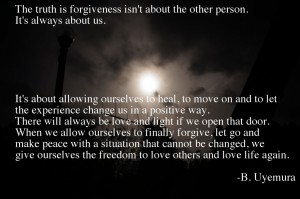☆ 其次是要愛自己。
所謂「愛自己」,包括了多方面:
‧注意自己身體的健康。
‧注意自己情緒的健康。
‧注意自己心靈的健康。
‧愛智,不斷學習,不斷進步。
Don’t be a prisoner of the past !
Remember the lessons learned and
learn how to learn them well.
Don’t allow yourself to be victimized again,
at least in similar situations.
Pain is inevitable, but it will pass.
Forget the pain, the shame and the hatred.
Let go of the suffering,
let the wound inside heal,
don’t let it get worse as time goes by.
Healing doesn’t mean the damage never existed.
We let the scars (lessons) stay,
but they no longer control our lives.
Yes, lessons must be learned
but (psychological) suffering is optional.
Wisdom is accessible.
( Jason Ling )
愛護自己身體和情緒的健康,就要放下怨恨。
但「放下」怨恨這種不良的情緒,
不等於「忘記」事件的教訓,
因為「忘記」事件的教訓就不愛自己!
對「認識自己」的人來說,「放下」比較容易,
對不甚「認識自己」的人來說,所謂忘記痛苦,
讓事情隨風而逝,別讓過去的事影響我們,
只是表面上漂亮,實質曖昧,不很負責任的說法而已,
等同廢話。
After the suffering has subsided,
we still need time to brew and stew
to recover from a bad experience.
We are permitted to become detached only after
the shock of an experience has been taken in,
allowed to “happen” in the deepest sense.
( May Sarton )
不是忘掉痛苦,而是記取教訓,放下怨恨,放過自己。
有些人不但不去汲取過往經歷的教訓,成為自己的經驗,
甚至將過去的經歷作為自己現在性格、行為或失敗的藉口。
過去的事情,當然會影響我們,
痛苦,當然已經成為了我們的一部份歷史,
但痛苦是否應該繼續,
我們應該怎樣被過去的事情影響,
才是我們自己的抉擇!
對已經發生,不能改變的事情如何思考、如何感受、如何回應,
我們依然擁有判斷和抉擇的自由。
「放下」的目的,純粹是為自己的「自由」著想,
為自己的身體和情緒的健康著想,
為自己寧靜的心著想,為自己心靈的成長著想。
所以事過境遷之後,你不一定要寬恕別人,
但一定要寬恕自己,釋放自己,
而所謂「寬恕自己,釋放自己」就是要放下怨恨,
避免在情緒方面被怨恨所囚禁,
為過去的事情繼續不斷地付出代價,不斷地付出利息,
將個人的能量損耗在沒有意義的地方。
Forgiving does not erase the bitter past.
A healed memory is not a deleted memory.
Instead, forgiving what we cannot forget
creates a new way to remember.
We change the memory of our past
into a hope for our future.
( Louis B. Smedes )
換句話說,就是我們不再憎恨對方,
也許我甚至會多謝對方給予我們一個成長的機會,
但並不表示我們不會看低對方,
亦不表示我們會寬恕對方。
寬恕,要視乎對方是否真心悔改,
寬恕,要視乎對方是否避免再傷害其他人。
當然有不少的情況,在深刻反思之後,是應該寬恕對方的,
但並非所有的情況都可以這樣處理,
因為要對個別事情的嚴重性作出判斷!
「原諒對方」和「繼續與對方做朋友」絕對是兩回事。
為了自己心靈的成長,我們寬恕之後,「放下」之後,
有時應該進一步「放下」對方,
不再和這樣一個低層次、不求上進、不重視心靈,
喜歡讓「我 ego」主持大局的對方來往。
Just because I forgive you doesn’t mean
I still keep you as a close friend.
I’m forgiving, letting go,
and also letting you out of my life.
Life is short and space is limited,
we should always let go of those
who bring down our souls in order to
move on to something bigger and better.
( Jason Ling )
You need to associate with people that inspire you,
people that challenge you to rise higher,
people that make you better.
Don’t waste your valuable time with people
that are not adding to your growth.
Your destiny is too important.
( Joel Esteen )
一般人喜歡說的所謂「化悲憤為力量」是語意不清的說法,
如果已經「放下」悲憤和怨懟,那麼力量從何而來?
「化教訓為經驗」及「化痛楚為力量」才是正確的說法。
在自己受傷的地方汲取教訓,然後運用這些經驗幫助後來者,
讓後來者不會再在同一地方遭逢滑鐵盧,
就是化痛楚、教訓為力量!
如果不謹慎思考,
部份人的「化悲憤為力量」恐怕變成了「化悲憤為仇恨」,
然後「化仇恨為報復」,開始一個你死我活的惡循環;
而另一部份人的「瀟灑地放下」恐怕亦縱容了壞人繼續行兇,
或苛政繼續肆虐。
我們在生命旅程之中,
常常忘記了應該記得的東西,卻緊記著我們應該忘記的東西。
前者就是「前車可鑑」的教訓,後者就是所有不良的情緒!
我們在生命旅程之中,又喜歡欺騙自己,隨而欺騙別人,
宣傳不盡不實的概念,扮演傳播偉人思想的角色,
或者扮演聰明學生的角色,急不及待地說:「我明!我立即明!」
不少真理,其實是極為隱蔽的。
「原諒」、「放下」、「前車可鑑」這三個詞彙都不是廢話,
只是並非顯而易明的概念,
部份寫作及勵志人士往往意圖利用這些詞彙胡混過關!
簡單地總結,就是
1. 要追求愛,培育原諒人的胸襟。
2. 要愛自己,「放下」不良的情緒。
3. 要有記取教訓的執著。
4. 要追求智慧,增添自己汲取教訓及閱人的能力。
能夠做到這四點,才有資格說「向前看,不要向後看」。
